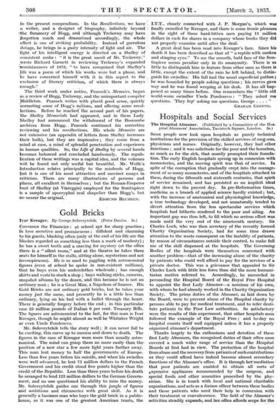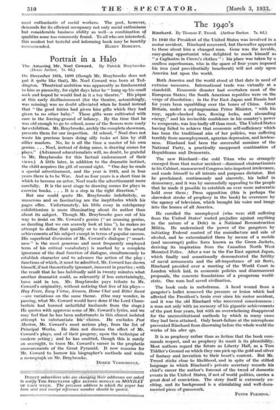Hospitals and Social Services
The Hospital Almoner. (Published by a Committee of the Hos- pital Almoners' Association, Tavistock Square, London. 3s.)
SOME people now look upon hospitals as purely technical institutions for the provision of the skilled services of surgeons, physicians and nurses. Originally, however, they had other functions ; and it was solicitude for the poor and the homeless, as much as for the sick, that usually prompted their founda- tion. The early English hospitals sprang up in connexion with monasteries, and the moving spirit was that of service. In spite of the.corruption that gradually crept into the manage-. ment of so many monasteries, and of the hospitals attached to them, during the fifteenth and sixteenth centuries, that spirit of service remained; and has persisted as an implicit ideal right down to the present day. In pre-Reformation times, medicine as a branch of applied science hardly existed ; but, with the increase of anatomical and physiological knowledge, a true technology developed, and not unnaturally tended to divert attention from the less spectacular services which, hospitals had hitherto rendered to the poor and ailing. An important gap was thus left, to fill which no serious effort was made until the very end of the nineteenth century. Sir Charles Loch, who was then secretary of the recently formed Charity Organization Society, had for some time drawn attention to the waste consequent on the inability of patients, by reason of circumstances outside their control, to make full use of the skill dispensed at the hospitals. The Governing Bodies of the hospitals were themselves concerned with another problem—that of the increasing abuse of the charity by patients who could well afford to pay for the -services of a private doctor. This was a grievance that appealed to Sir Charles Loch with little less force than did the more humani- titrian motive referred to. Accordingly, he succeeded in persuading the Hospital Board of the Royal Free Hospital to appoint the first Lady Abiroher—S nominee of his own, with whom he had already worked in the Charity Organization Society. The prime duties of the Almoner, as laid down by, the Board, were to preyent abuse of the Hospital charity by persons able to pay for medical treatment, and to refer desti- tute patienti to the Poor Law authorities. So satisfactory were the results of this experiment, that other hospitals soon followed the example of the Royal Free ; and to-day no hospital counts itself well equipped unless it has a properly organized almoner's department.
Thanks largely to the enthusiasm and devotion of these first Lady Almoners, the recognized duties of their office soon covered a much wider range of service than the Hospital Boards at first had in view. The protection of the hospital from abuse and the recovery from patients of such contributions as they could afford have indeed become almost secondary functions of the Almoner's office. It is through her:mediation that poor patients are enabled to obtain all sorts of expensive appliances recommended by the surgeon, and special foods and other amenities prescribed by the phy- sician. She is in touch with local and national charitable organizations, and acts as a liaison officer between these bodies and those patients who need their help in connexion with their treatment or convalescence. The field of the Almoner's activities steadily expandsoind.her-office affords scope for the
most enthusiastic of social workers. The post, however, demands for its efficient occupancy not only social enthusiasm but considerable business ability as well—a combination Of qualifies none too commonly found. . To all who are interested, this modest but tasteful and informing book maybe heartily



















































 Previous page
Previous page